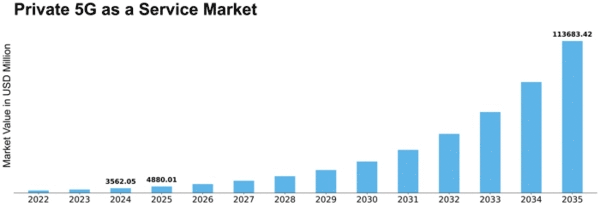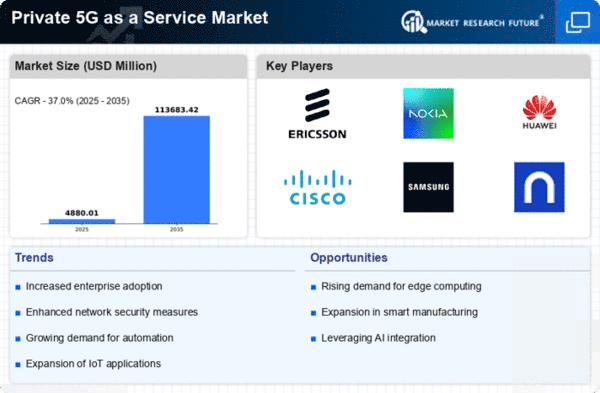Private 5g As A Service Size
Private 5G as a Service Market Growth Projections and Opportunities
The Private 5G as a Service market is rapidly evolving, driven by a multitude of market factors that collectively shape its trajectory. One key factor influencing the market is the increasing demand for reliable and high-performance connectivity solutions in various industries. As businesses embrace digital transformation, the need for robust and secure communication networks becomes paramount. Private 5G networks offer a dedicated and efficient solution, catering to the specific requirements of organizations across sectors such as manufacturing, healthcare, and logistics.
Another significant market factor is the growing recognition of the importance of low-latency communication. Industries like manufacturing and automation demand real-time responsiveness, and Private 5G networks provide the necessary infrastructure to meet these demands. The ability to process and transmit data with minimal delay is crucial for applications like robotics, IoT devices, and autonomous systems, driving the adoption of Private 5G services.
Security concerns also play a pivotal role in shaping the Private 5G as a Service market. Many businesses are increasingly wary of relying on public networks due to potential vulnerabilities and cyber threats. Private 5G networks offer a higher level of security, allowing organizations to have better control over their data and communication channels. This enhanced security is particularly crucial for industries dealing with sensitive information, such as healthcare and finance.
Moreover, the flexibility and customization options provided by Private 5G networks contribute significantly to their market growth. Businesses can tailor these networks to meet their specific needs, adjusting parameters like bandwidth, coverage, and quality of service. This adaptability is especially advantageous in dynamic environments where connectivity requirements may vary over time.
The integration of edge computing is another influential market factor. Private 5G networks, coupled with edge computing capabilities, enable organizations to process data closer to the source, reducing latency and improving overall system efficiency. This integration is particularly valuable for applications that rely on real-time data analysis, such as augmented reality (AR) and virtual reality (VR) experiences.
Cost efficiency is also a driving force in the Private 5G as a Service market. As technology advances and adoption increases, the costs associated with deploying and maintaining Private 5G networks are expected to decrease. This affordability makes these services more accessible to a broader range of businesses, fostering market growth.
The regulatory landscape is a crucial factor influencing the Private 5G market, as governments around the world are actively shaping policies related to spectrum allocation and network deployment. Clear and favorable regulations can accelerate the adoption of Private 5G networks, while ambiguous or restrictive policies may impede growth. Industry stakeholders closely monitor and respond to regulatory developments to navigate the evolving landscape successfully.


















Leave a Comment